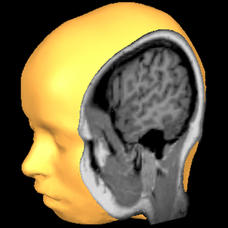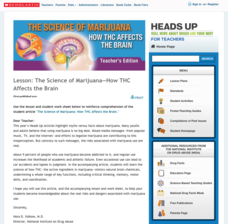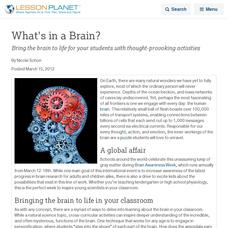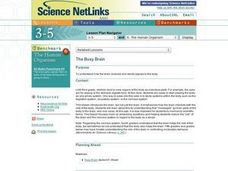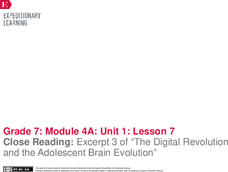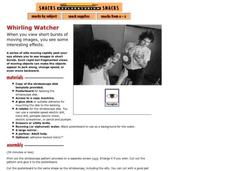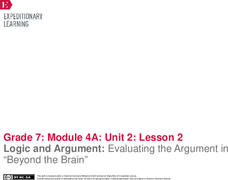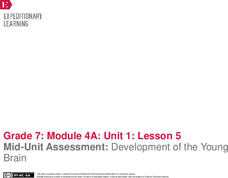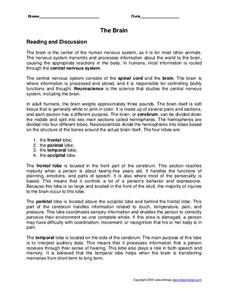Curated OER
Brain-Controlled Robotic Arms: Cloze activity with Article
Fascinating content about current medical research on brain-controlled prosthetics comes in cloze activity form with a link to the original article. Useful for listening and reading comprehension skills development, and for any science...
Rainer Goebel
Brain Tutor 3D
The human brain is staggeringly complex, and its structure can seem impossible to grasp. This user-friendly app allows for exploration of the brain's anatomy, providing nomenclature, 3-D mapping, and functions.
3Dme Pty
Alcohol and Your Brain
Through an engaging video and quiz, learn about the effects of alcohol on specific regions of the brain, as well as general effects on the body.
Encyclopedia Britannica
Meta-Study: Political Brains
Are there differences in the brains of liberals and conservatives? That is the question young political scientists are challenged to answer. Class members examine studies, consider how the results are presented, and how the studies were...
Kenan Fellows
Unit 4: The Brain
Drugs interact with the brain to alter moods, emotions, and behaviors by changing the brain's chemistry, perceptions, and interactions. The final lesson in the Pharmacology unit shows scholars experiments, has them complete four labs,...
Curated OER
Phineas Gage: The Teenage Brain and Connections: Free Choice Activity
During this lesson, which is all about making connections, learners watch a documentary about the teenage brain and connect it to Phineas Gage: A Gruesome but True Story About Brain Science, their own lives, and the world.
PBS
Stories of Painkiller Addiction: The Brain on Autopilot
For some people, the force of addiction can be as biologically compelling as the drive for food or water. High schoolers watch a video segment about Ryan, a recovering addict, and learn more about how opioids and other drugs can affect...
Curated OER
The Brain’s Inner Workings
Do you want to learn about how you learn? Help pupils become the best learners they can be by teaching them how their brain works. The resources available include videos about brain structure and a study guide full of activities that...
Scholastic
The Science of Marijuana—How THC Affects the Brain
Marijuana can affect every part of a user's life—starting with the delicate nervous centers of the brain. An informative article and worksheet prompt teenagers to learn more about how the THC found in most forms of marijuana can...
National Institute on Drug Abuse
The Brain's Response to Drugs
Marijuana affects the brain differently than inhalants, which have a different effect than opioids. Elementary and middle school classes read about these drugs as well as nicotine, methamphetamine, hallucinogens, and steroids before...
Curated OER
What's in a Brain?
Bring the brain to life for your students with thought-provoking activities
Curated OER
The Busy Brain
Learners explore biology by completing a human body worksheet. In this human brain lesson, students identify the different anatomy within the brain and the functions those pieces form. Learners read an article about signals in the brain...
Curated OER
The Brain Teaser Five Pack
In this critical thinking worksheet, students explain in their own words the answers to 5 mentally challenging brain teasers asked on the worksheet.
EngageNY
Close Reading: Excerpt 3 of “The Digital Revolution and the Adolescent Brain Evolution”
It's time to level up and discover how video games affect the brain. Pupils explore the topic as they continue reading excerpts from an article about adolescent brain development and the digital revolution. Scholars also participate in a...
Exploratorium
Whirling Watcher
Pupils put together their own stroboscopes so that they can observe how cyclically moving images appear to merge into a singular object. This, and several other activities published by the same source, illuminate the way the brain...
EngageNY
Identifying Main Ideas and Supporting Details: What’s Going On in the Teenage Brain?
What's going on in the teen brain? Pupils consider the question as they continue reading an informational article about the topic. While reading, they use a Thinking Log worksheet and an anchor chart to track their understanding of...
EngageNY
Logic and Argument: Evaluating the Argument in “Beyond the Brain”
The brain is not the mind. Scholars explore the claim by reading an informational article about neuroscience research, "Beyond the Brain." As they read, they answer text-dependent questions and complete an anchor chart to evaluate...
EngageNY
Mid-Unit Assessment: Development of the Young Brain
Scholars view a video clip about adolescent brain development and work with partners to identify the main idea and supporting details. Next, as part of the mid-unit assessment, pupils watch another clip from the video and complete a main...
EngageNY
Close Reading: Excerpt 5 of “The Digital Revolution and the Adolescent Brain Evolution”
Class members consider how technology affects social interactions as they continue reading an article about the digital revolution and adolescent brain development. Then, working in pairs, scholars answer text-dependent questions and...
Baylor College
Neurotransmitters Contain Chemicals
Human body systems students play a card game, "Locks & Keys" in order to learn that neurotransmitters carry a message from one neuron to another by fitting into a receptor site on the receiving nerve cell. While this activity can...
Curated OER
Be Brain Smart
Students examine the function of the brain. Using the internet, they research facts of the brains of vertebrates. Using clay, they make three sculptures of brains of different vertebrates and use crayola colors to color it. To end the...
Curated OER
Brain Power
In this science worksheet, students investigate the anatomy and function of the human brain. Students read facts about the parts of the brain and what each does. Students compare the size of the human brain to that of other animals....
Curated OER
The Brain
In this brain worksheet, students read about the brain, its four parts, and their functions, and answer comprehension questions. In this fill in the blank and true and false worksheet, students answer thirteen questions.
Curated OER
Perception and the Brain
Students experience how the brain adapts over time to changes in what they perceive. In this human perception lesson, students wear special prism goggles that initially disorient the user. Over time, the student is able to adjust to the...
Other popular searches
- Brainstorming
- Brain Anatomy
- Brain Teasers
- Human Brain
- The Brain
- Brainstorm
- Brainstorming Questions
- Brainstorming for Writing
- Writing Brainstorming
- Brainstorming Topics
- Brainstorming Ideas
- Brainstorming Methods



